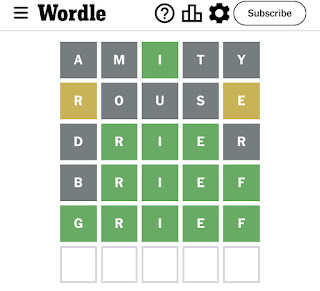Grief is a puzzle -- and not just when it's a Wordle solution.
 |
| This was Friday's puzzle. Don't @ me. |
My grandfather? I wondered. Dad's father was named Lawrence; he died when my father was nine years old. My brother was named after him. So I clicked through.
Nope, not my grandfather. My brother, who died in March of last year. This was the first I'd heard.
When I wrote my memoir Mom's House, I knew the story wasn't finished. To recap: My brother had been verbally and emotionally abusive to me since I was small. When my mother died in 2008, she left our family home to both of us. I wanted to sell the place; my brother tried every manipulative trick he could think of to keep us both owners of the house. Finally, I filed a partition action against him to force a sale. We came thisclose to mediation before he agreed to buy me out. That was in early 2018. Later that year, I published the memoir.
I hadn't heard from him, or anyone else in his side of the family, since. If it hadn't been for Ancestry bringing it to my attention, I still wouldn't know he was dead.
***
People go through a whole range of emotions when someone they know dies, and adding abuse to the mix makes those emotions more complicated. This website lists many of the feelings abuse victims might have to work through: fear and anxiety, depression, guilt, loneliness, shame, helplessness, relief, disbelief, and anger. The site also mentions a phenomenon called disenfranchised grief, which can happen when, say, an abused person is upset when an abuser dies. Friends might wonder how the victim could grieve when the abuser did such horrible things to them. But an abused person can both acknowledge the horrible things and be sad about losing the good times. The abuser may have orchestrated the good times to keep the victim on the hook, but that doesn't mean the victim can't miss those good times and be sad that they're over forever. Humans are a bundle of contradictions.
But if the abused person expresses anger at the death of their abuser, that's also not okay, right? We're supposed to forgive those who trespass against us, and not forgiving someone who wronged you is bad for your own mental health, or so they say. And then, of course, we're told not to speak ill of the dead.
My opinion is that "don't speak ill of the dead" is horseshit. And alert hearth/myth readers already know my views on blanket forgiveness. Basically, I believe that forgiveness must be earned -- and frankly, my brother never earned my forgiveness. There was only one time that he came close. I wrote about it in Mom's House:
It came during the trip we made to Mom’s house in the summer of 2012. He cornered me in the garage for a chat. After a discussion about this and that, he gave me a serious look and said, “I know I was rough on you when we were kids.” And then he proceeded to share with me some personal revelations, most of which I won’t go into here. The key takeaway for me was that all through my childhood, he had been jealous of me. “They wanted you,” he said.
What I left out, when I described the scene in the book, was the vitriol with which he said it. He was still jealous of me. Fifty-five years later, he was still mad that his favorite sister had died and I'd come along to take her place. As if any of that had been my fault.
***
It's been almost a week since I learned of my brother's death, and I don't seem to be feeling many of the complicated emotions that abuse victims feel when their abuser dies. It's not that the abuse didn't happen. That's not in dispute. I think what's going on is that I've worked through these feelings long since.
There's a chipper little Wikihow page for coping with the death of an abuser. Among the suggestions: Accept your feelings, however complicated; find ways to channel your anger; make a list of ways to give yourself closure; and so on.
I gave myself closure by writing and publishing the memoir. I wasn't surprised when I lost contact with Lar and his family -- I knew it would be the result before I hit "publish" -- and I'm not surprised they didn't contact me when he died.
Am I relieved? No more -- and no less -- than I was when I got the settlement check. The house was the last thing we shared -- the last way he had to keep me on a string. That's a big reason why I wanted out from under it.
I'm sure I'll have complex feelings crop up from time to time; that's how grief works. But here's one feeling -- or goal, really -- I'm holding onto now: The guy who spent decades haranguing me about my weight and my health died at 74 -- relatively young, given that Mom lived to be 93. If I make it another ten years, I will have outlived him.
***
Two more things I've discovered since learning about my brother's death (public records searches are a wonderful thing):
1) In late 2017 -- long after I'd filed suit, but a few months before the settlement -- Lar and his wife bought a house in Florida. I have to think he was pressuring me to move back to Indiana for his own benefit.
2) As of the beginning of this month, Mom's house was still listed as owned by my brother...and my mom.
***
These moments of WTF blogginess have been brought to you, as a public service, by Lynne Cantwell. Stay safe, everybody!


